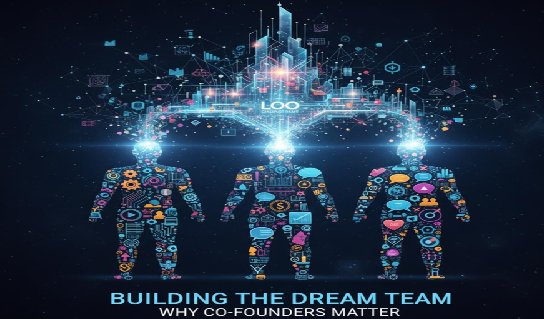Behind every successful startup is not just a visionary founder but a team that brings the vision to life. No matter how brilliant an idea is, execution depends on people. Building a strong founding team is one of the most critical yet often overlooked factors that determine whether a startup thrives or fails.
This week, we explore why co-founders matter, what makes a great team, and how trust, culture, and complementary skills become the foundation of a company’s long-term success.
1. The Power of Complementary Skills
Startups succeed when founders bring different strengths to the table. One may be a product genius, another a marketing strategist, and a third an operations expert. Together, they form a balanced engine that can take an idea from concept to market.

At Apple, Steve Jobs was the visionary and communicator, while Steve Wozniak was the engineering mastermind. Their partnership worked because their skills complemented rather than competed with each other. Similarly, at Zerodha, Nithin Kamath handled the business strategy while his brother Nikhil Kamath focused on trading and operations, a balance that helped the company scale sustainably.
When building a team, founders should ask: What skills do I lack, and who can fill those gaps effectively?
2. Trust : The Invisible Currency of Startups

Startups are chaotic, unpredictable, and high-pressure environments. Trust acts as the glue that keeps the team together through uncertainty. Trust means believing in each other’s intentions, respecting differences, and maintaining transparency, especially when things go wrong.
Without trust, even the most talented teams can crumble under stress. A co-founder should be someone you can debate fiercely with during the day and still share a meal with at night. As many experienced founders say, “Choosing a co-founder is like choosing a life partner.”
3. Culture : The Soul of the Startup

Culture defines how a startup thinks, behaves, and grows. It’s not just about perks or values written on the wall; it’s about daily actions. A great startup culture encourages open communication, ownership, learning, and empathy.
For instance, Zoho is known for its people-first philosophy, focusing on employee growth and long-term thinking rather than rapid expansion. This strong cultural foundation has made Zoho one of India’s most sustainable and admired tech companies.
When the founding team embodies a strong culture early on, it trickles down naturally as the company scales.
4. Networking : Building Connections Beyond the Core Team

While the founding team is the heart, the extended network of mentors, advisors, and early supporters becomes the startup’s backbone. Founders should actively connect with professionals who can provide honest feedback, open doors to investors, or even help hire key talent.
Attending entrepreneurship meetups, incubator programs, or startup accelerators can introduce you to potential co-founders and collaborators who share your passion and purpose.
5. Lessons from Successful Founders
- Brian Chesky (Airbnb) credits his co-founders Joe Gebbia and Nathan Blecharczyk for their diverse skill set in design, coding, and business strategy that turned a simple idea into a global hospitality platform.
- Bhavish Aggarwal and Ankit Bhati (Ola) combined tech brilliance with market understanding to create a business that reshaped India’s mobility ecosystem.
- Sergey Brin and Larry Page (Google)built one of the world’s most successful partnerships by challenging each other intellectually while maintaining mutual respect.
These examples remind us that startups are not built by solo heroes but by aligned teams who trust the process and each other.
A startup’s early team is its strongest predictor of success. Co-founders are not just business partners; they are co-dreamers, co-fighters, and co-builders of a shared vision. The right combination of skills, trust, and culture can turn an ordinary idea into an extraordinary company.
Take a moment to reflect. If you’re building a startup, who would you want beside you on this journey? Identify people whose values align with yours but whose skills differ. Because in the world of entrepreneurship, no dream is built alone.




